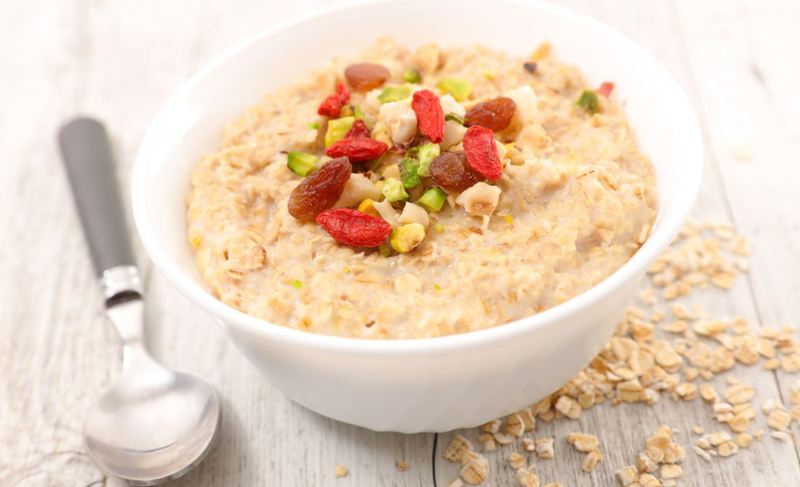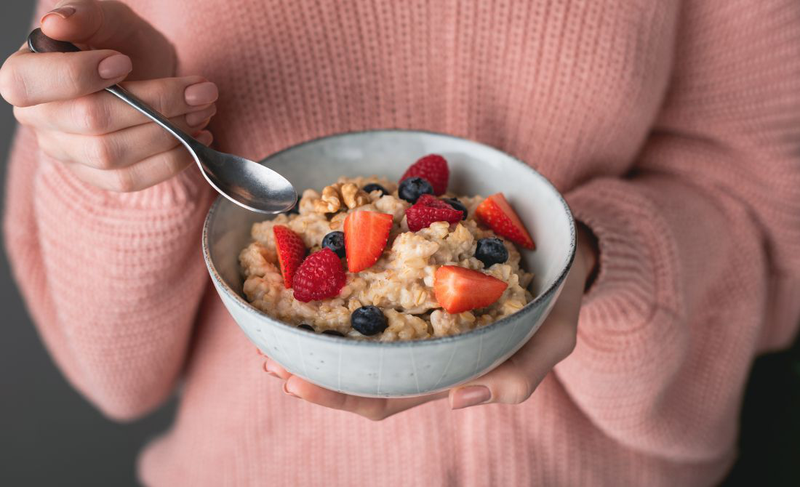Oatmeal is a nutritious cereal, often chosen for breakfast, snacks or light meals. But have you ever wondered when to eat oatmeal to maximize its benefits?
Starting the day, having a snack in the afternoon or replenishing energy after a workout with a bowl of delicious oatmeal has become a habit of many people. With a high fiber content and many other nutrients, oatmeal brings many health benefits. So, what time of day is best to fully enjoy the nutritional value of this cereal? If you don’t know when to eat oatmeal, find out now.
When should you eat oatmeal?
Oatmeal is not only a delicious cereal but also a rich source of nutrients. So, when is the right time to eat oatmeal?
Morning – the ideal time to eat oatmeal
Oatmeal is considered one of the great choices for breakfast. Many nutritionists recommend eating oatmeal in the morning. Starting the day with a bowl of oatmeal will provide abundant energy for the whole morning. The fiber in oatmeal has the ability to slow down the digestive process, help stabilize blood sugar, prevent sudden hunger and maintain stable energy when studying or working.
In addition, some studies show that the nutrients in oatmeal also have the effect of improving mood, helping you to be more alert and focused.

Many people want to know when to eat oatmeal?
Eat oatmeal for lunch or dinner
Eating oatmeal instead of rice is also the choice of many people. In addition to breakfast, you can absolutely enjoy oatmeal for lunch or dinner. A bowl of oatmeal for lunch will be a nutritious and energetic snack. In the evening, oatmeal is a great choice to help you relax and sleep better thanks to its tryptophan – an amino acid that helps create a feeling of sleepiness.
Before or after exercise – the right time to eat oatmeal
Oatmeal is rich in complex carbohydrates. Eating oatmeal before exercise helps provide sustainable energy for the body throughout the workout. The fiber in oatmeal helps stabilize blood sugar, preventing hypoglycemia during exercise. In addition, oatmeal also provides vitamins and minerals necessary for energy metabolism, helping you exercise more effectively.
After exercise, the body needs to be replenished with energy to recover. Oats provide carbohydrates that help rebuild muscle glycogen stores. Combining oats with protein sources such as milk, eggs, or nuts will help restore and build muscle more effectively. To enhance muscle recovery, you should combine oats with protein sources or whey protein.

Oatmeal provides energy to the body before or after exercise.
Factors affecting the time to eat oatmeal
When to eat oatmeal depends on many different factors. Each person has their own health goals, activity levels, and preferences. Therefore, the appropriate time to eat oatmeal will also be different for each person.
Health goals are an important factor in determining when you eat oatmeal. With the way to eat oatmeal to lose weight, you can use this food instead of main meals. It can help you stay full longer, reduce cravings, and control your weight more effectively.
On the contrary, if you want to gain weight, you can eat oatmeal in many snacks during the day. If you want to work out to gain muscle, combine oatmeal with protein-rich foods and eat them before or after your workouts. For people with diabetes, oatmeal is a great alternative to white rice. It helps people with diabetes stabilize blood sugar thanks to its high fiber content.
Your level of physical activity also affects when you should eat oatmeal. People who do intense exercise need more energy. So they can eat oatmeal before or after exercise to fuel their bodies.
Finally, personal preference is also a factor that cannot be ignored. Some people enjoy a hot bowl of oatmeal in the morning to start their day. Meanwhile, others like to eat cold oatmeal mixed with fruit in the evening. The most important thing is that you feel comfortable and enjoy your meal.

There is no hard and fast rule about when to eat oatmeal.
How to eat oats for good health
Many of us probably know the benefits of oats. However, in addition to when to eat oats, you should also learn how to eat oats for good health.
Be careful with oatmeal allergies
Some people are allergic to oats when their body’s immune system overreacts to a protein called avenin. Some oat products may be contaminated with gluten from other grains. This causes a reaction in people with celiac disease or gluten intolerance. Common symptoms of oatmeal allergies are: Redness, itching, rash, swelling, sneezing, stuffy nose, difficulty breathing, abdominal pain, nausea, diarrhea, etc.
Prefer to use whole oats
Whole oats contain more fiber and nutrients than processed oats. Processed oats are often added by manufacturers with other ingredients such as sugar, flavorings, flavor enhancers, etc. These ingredients are often not good for your health.
Drink enough water when eating oats
Soluble fiber in oats has the ability to absorb water and swell, forming a gel in the intestines. When fiber is not supplied with enough water, it can cause bloating and flatulence. Therefore, drink enough water while eating oats to support the digestive process.

Both children and adults should eat oats properly to maximize their benefits.
To get the most out of oatmeal, you should adjust the amount of oatmeal to suit each meal and your body’s needs. For example, in the morning, you can eat a full bowl of oatmeal, and in the evening, a small amount of oatmeal will be enough.
When should you eat oatmeal? You have the answer here, right? The time to eat oatmeal can be flexibly adjusted according to your needs and personal preferences. The most important thing is that oatmeal should be included in your regular diet and eaten properly to maximize its health benefits.





